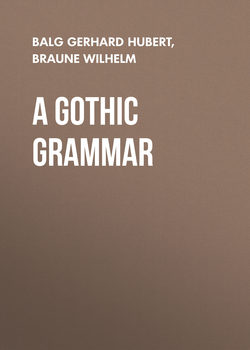Читать книгу A Gothic Grammar - Braune Wilhelm - Страница 4
FONOLOGY
CHAP. II. THE VOWELS
e
Оглавление§ 6. e is always a long, close vowel (ê) approaching very much the sound of i [as in E. they].
Note 1. In Greek words η is regularly represented by ê; e. g., Gabriêl, Kêfas, aíkklêsjô, Krêta; – sumtimes also ι: Naên, Ναίν; Tykêkus, Τυχικός; aíloê, ἐλωί; likewise e: Jarêd, Ἰαρέδ.
Note 2. In Gothic names Latin writers employ e for Gothic ê: Sigismêres, Gelimêr, Reccarêd; besides, as erly as the 6th century, quite regularly also i; as, Theodemir, Valamir. Cp. Beitr., 11, 7 et seq.; Wrede, Wand., 92 et seq.
§ 7. Goth. ê (which regularly corresponds to OHG. and OS. â; ahd. gr., § 34) is found:
(a) in reduplicating verbs, in part with the ablaut ô (§§ 179. 181): grêtan, lêtan, slêpan; (b) in the prt. pl. of the IV. and V. ablaut-series: sêtum (inf. sitan, to sit), nêmun (inf. niman, to take), têmum (inf. timan, to befit), êtum (inf. itan), and in the prt. sg. frêt; Luc. XV, 30 (§ 176, n. 3); (c) in derivativs from the verbal stems givn under (b); as, andanêms, agreeabl; andanêm, a receiving; gatêmiba, becumingly; uzêta, manger; (d) in other words; as, jêr, year; qêns, wife; mêna, moon; lêkeis, fysician; mêrjan, to preach; manasêþs ('man-seed'), world, etc.; (e) in formativ syllabls: fahêþs, joy; awêþi, flock of sheep (cp. however § 17, n. 1); azêts, easy; 2nd pers. sg. prt. of wvs., -dês (nasidês, § 184); (f) final: in the ending of the gen. pl.; as, dagê; in monosyllabic instrumentals: þê, ƕê (§§ 153. 159); in particls and advs.; as, swê, untê, hidrê, bisunjanê; lastly, in the dativs ƕammêh, ƕarjammêh, ainummê-hun (cp. §§ 163-166).
Note 1. ê before vowels appears as ai; s. § 22.
Note 2. ei occurs quite often for ê, especially in the Gospel of St. Luke; as, qeins (= qêns), faheid (= fahêd), fraleitais (= fralêtais); Lu. II, 5. 10. 29; afleitan; Mt. IX, 6, etc.
Note 3. Sporadically also i for ê; so, frequently, in the Gospel of St. Lu.; as, birusjôs; Lu. II, 41; qiþeina; VIII, 56. IX, 21; tawidideina; VI, 11; duatsniwun; Mk. VI, 53. Only i is found in wriþus, herd; Lu. VIII, 33 (for wrêþus; cp. Bezzenb. Beitr. 3, 114).
Note 4. Reversely, also e occurs for i and ei (§ 10, n. 5; § 17, n. 1). – These deviations (in ns. 2-4) seem due to East Gothic writers; cp. Wrede, 'Ostg.', 161.
§ 8. From the preceding ê must be separated the ê of sum Gothic words in which it corresponds to OHG. ea, ia (not â): hêr, here; Krêks, Greek; fêra, side, region; mês, table. Cp. ahd. gr., §§ 35. 36; Beitr., 18, 409 et seq.
